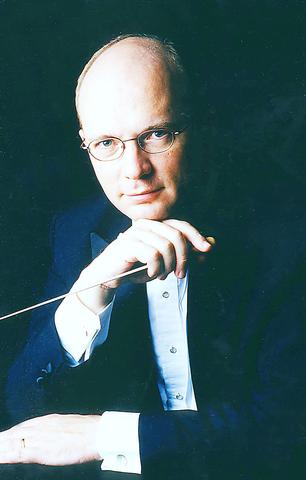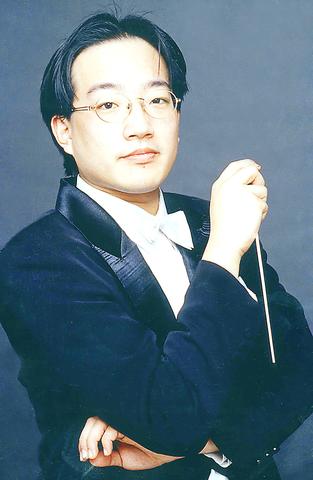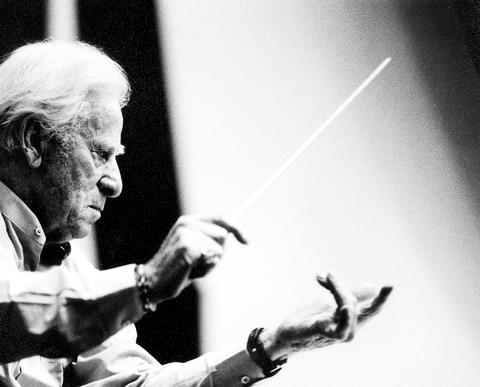In 1985, Henry Mazer, then guest conductor at Chao Yun Ensemble (
Led by Mazer, the group's music director and conductor, Chao Yun changed its name later the same year to Taipei Sinfonietta. In 1991, in order to enlarge the group's repertoire, he pushed through the groups restructuring, turning it into the Taipei Sinfonietta and Philharmonic Orchestra (台北愛樂室內及管弦樂團).
The orchestra later became the first Taiwanese group to perform at the world-renowned Grosser Musikvereinssaal in Vienna and the Boston Symphony Music Hall, where it won worldwide acclaim. This Sunday night, the orchestra will set another record by being the first orchestra in Taiwan to hold its 100th concert. None of this would have happened without Mazer.

PHOTO COURTESY OF TSPO
Born in Pittsburg, Mazer started conducting at age 17 in his community choir. His performance drew the attention of master conductor Franz Riener, who later became his teacher. In 1966, he assisted William Steinberg, then conductor of the Pittsburg Symphony Orchestra. When Steinberg fell ill in 1970, he substituted for him at Carnegie Hall, performing with pianists Rudolf Serkin and Artur Rubinstein, vocalist Marian Anderson, guitarist Andres Segovia, violinist Isaac Stern and so on, winning accolades from music critics.
He showed his full talent in the Chicago Symphony Orchestra, where he worked as assistant conductor and also trained musicians at the behest of conductor Sir Georg Solti. In Chicago, he devoted himself to music education on the university campus before moving to Taiwan. Before leaving, Mazer told the media in Chicago that "before coming to Chicago, I strived to be an orchestra builder. During my time with the Chicago Symphony Orchestra I tried to be an educator. These are the two fields in the music industry that intoxicate me most. In Taiwan, I'm going to do these two things at the same time." To commemorate Mazer's contribution to the classical music scene in Chicago, Harold Washington, then the city's mayor, proclaimed May 24 "Henry Mazer Day."
It's more than the voice from the gods, that led Mazer stay in this country for some 17 years.

PHOTO COURTESY OF TSPO
"Maestro Mazer often says that he's spent the best time of his life in Taiwan. Here, everyone he has worked with becomes his friend. He is also friends with his students. His friendship with so many people has kept him in Taiwan," said Lin Tian-ji (
According to Lin, Mazer has a unique way of teaching conducting. "In his point of view, being a gentleman and being a good conductor are inseparable. Once he was in my car when I forgot to let a pedestrian cross the street first. He got so angry he kept lecturing me all the way. ... His point is that if there are problems in your character, there must be problems in your conducting," Lin said.
Mazer's strictness probably comes from his great expectation from his students. His first few encounters with musicians in Taiwan convinced him that they were quick, responsive, sensitive to notes and their performance on strings were particularly delicate. For Mazer, they are the kind of musicians, that, given proper training, would be world-class performers.

The fruits of his training will show at Sunday's tribute concert through the conducting performances of Lin and John van Deursen, Mazer's student of 12 years.
The music director of the recently-founded Taipei Jazz Music Group and TSPO's principal guest conductor, Van Deursen attributes the success of his conducting career to Mazer's teaching. "Mazer's ideas about conducting influenced me a lot. He never gestures wildly when he is conducting. This is because he wants to show more of the composer, but less of the conductor. Instead of personal interpretation of the music, he wants to present what the composers really wanted when they wrote the music," he said.
"Maestro Mazer's other idea is his respect for the musicians. He never tries to make the music sound perfect by going over the same number again and again or asking the musicians to play with mechanical precision. Rather, he goes for the big idea and creates naturally flowing music," Van Deursen added.
At Sunday's concert, the orchestra is going to perform three numbers of significance in the group's history. Grieg's Aus Holbergs Zeit Op. 40 was the piece the orchestra performed in their first live television broadcast. The international critical acclaim for their recording of Elgar's Introduction and Allegro won the group their first chance to perform abroad. The two pieces will be performed with John van Deursen. Lin Tian-chi, will conduct the third number, Mahler's Symphony No. 1, Titan. The large-scale orchestration required by the number shows that the group has successfully transformed into a philharmonic orchestra. More importantly, it was chosen for its title that appropriately expresses the orchestra's gratitude and reverence for their music director. As he is recovering from a recent stroke, Mazar himself will likely not be in attendance.

Taiwan can often feel woefully behind on global trends, from fashion to food, and influences can sometimes feel like the last on the metaphorical bandwagon. In the West, suddenly every burger is being smashed and honey has become “hot” and we’re all drinking orange wine. But it took a good while for a smash burger in Taipei to come across my radar. For the uninitiated, a smash burger is, well, a normal burger patty but smashed flat. Originally, I didn’t understand. Surely the best part of a burger is the thick patty with all the juiciness of the beef, the

The ultimate goal of the Chinese Communist Party (CCP) is the total and overwhelming domination of everything within the sphere of what it considers China and deems as theirs. All decision-making by the CCP must be understood through that lens. Any decision made is to entrench — or ideally expand that power. They are fiercely hostile to anything that weakens or compromises their control of “China.” By design, they will stop at nothing to ensure that there is no distinction between the CCP and the Chinese nation, people, culture, civilization, religion, economy, property, military or government — they are all subsidiary

This year’s Miss Universe in Thailand has been marred by ugly drama, with allegations of an insult to a beauty queen’s intellect, a walkout by pageant contestants and a tearful tantrum by the host. More than 120 women from across the world have gathered in Thailand, vying to be crowned Miss Universe in a contest considered one of the “big four” of global beauty pageants. But the runup has been dominated by the off-stage antics of the coiffed contestants and their Thai hosts, escalating into a feminist firestorm drawing the attention of Mexico’s president. On Tuesday, Mexican delegate Fatima Bosch staged a

Nov.10 to Nov.16 As he moved a large stone that had fallen from a truck near his field, 65-year-old Lin Yuan (林淵) felt a sudden urge. He fetched his tools and began to carve. The recently retired farmer had been feeling restless after a lifetime of hard labor in Yuchi Township (魚池), Nantou County. His first piece, Stone Fairy Maiden (石仙姑), completed in 1977, was reportedly a representation of his late wife. This version of how Lin began his late-life art career is recorded in Nantou County historian Teng Hsiang-yang’s (鄧相揚) 2009 biography of him. His expressive work eventually caught the attention